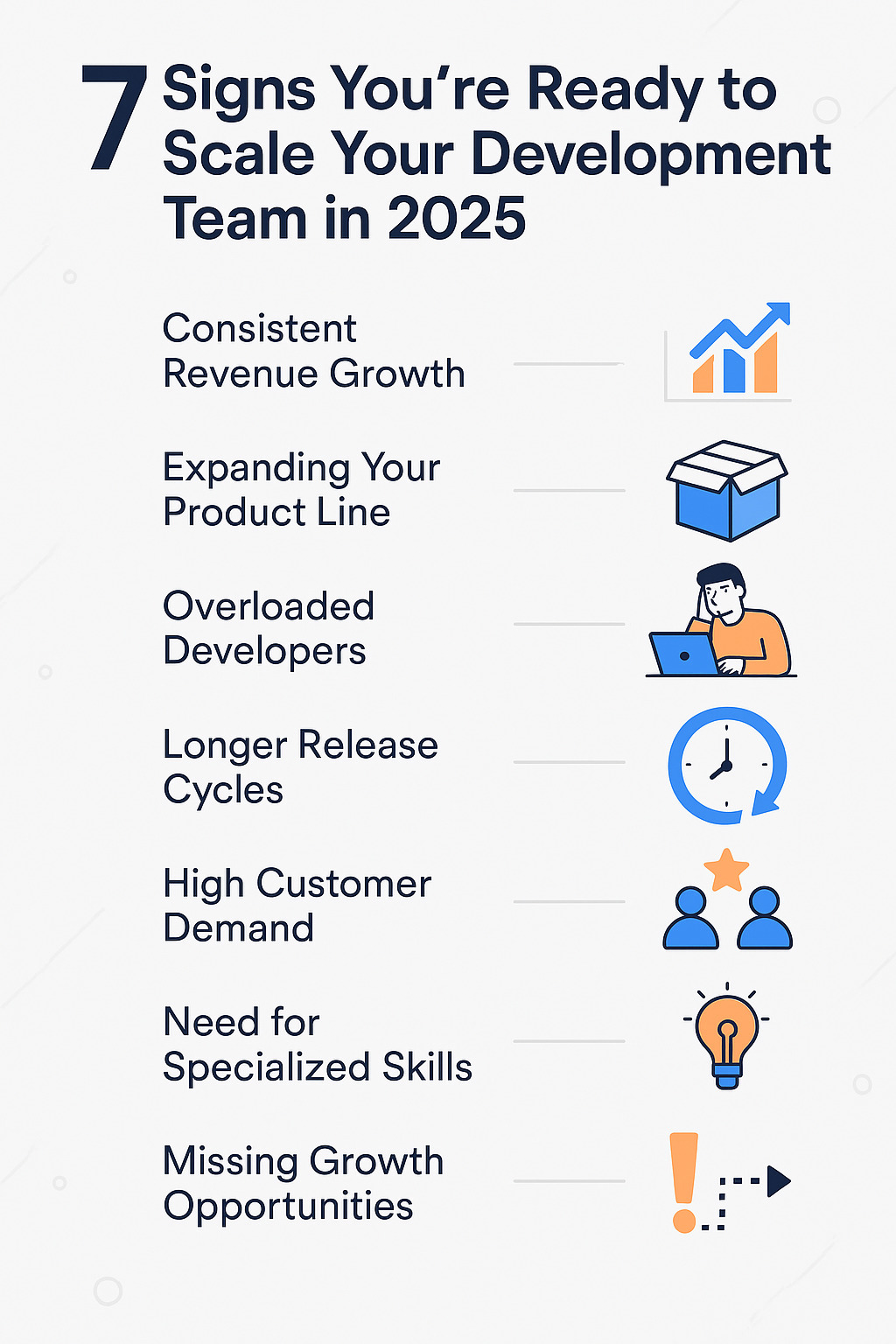5 Secrets to Scaling Your Tech Team for Beginners in 2025
- 1 min read
Scaling a tech team in 2025 requires more than just hiring more developers. It’s about smart processes, scalable systems, and leveraging global talent. This blog post breaks down 5 beginner-friendly secrets to grow your development team sustainably.

Scaling a tech team in 2025 isn’t just about hiring more developers. It's about strategically growing your team while keeping productivity high, budgets optimized, and communication seamless. Whether you're a startup founder, team lead, or non-technical manager, here are 5 beginner-friendly secrets to help you scale your software team the smart way.
1. 🌍 Embrace Global Talent—Especially in Eastern Europe
One of the biggest wins for scaling tech teams today is tapping into global developer markets, especially regions like Eastern Europe. Countries like Poland, Romania, Turkey ,and Ukraine offer:
- Highly skilled engineers
- Strong English proficiency
- Competitive rates compared to Western Europe or the U.S.
- A robust remote-work culture
Hiring remote developers from this region lets you scale efficiently without compromising on quality.
👉 Check out Euro IT Sourcing to see how Eastern European engineers boost productivity through AI-supported workflows.
2. 🛠️ Standardize Your Tech Stack
Before scaling, streamline your development environment. A messy tech stack slows down onboarding and collaboration. Consider:
- Choosing 1–2 main frontend frameworks (e.g., React or Vue.js)
- Using containerization tools like Docker to unify dev environments
- Automating builds, testing, and deployment with tools like GitHub Actions or CircleCI
By standardizing early, new team members can onboard faster and contribute sooner.
3. 🔁 Build Repeatable Onboarding & Training Systems
Every new hire costs time and attention. To scale smoothly, develop:
- An onboarding playbook that includes environment setup, access links, and company values
- A mentorship or buddy system for new devs
- Documentation for codebases and recurring workflows
Consider using Notion or Confluence to house all your training resources.

4. 🤝 Balance In-House and External Contributors
Scaling doesn’t always mean hiring full-time. Many successful companies combine:
- Core in-house engineers (handling strategy and architecture)
- External developers or agencies (for short-term feature builds or product MVPs)
- Freelancers (for UI design, DevOps, or specialized tasks)
Platforms like Toptal or Upwork can be helpful, but for enterprise-scale, consider partnerships with vetted staffing companies.
5. 🧭 Implement Agile Without the Buzzwords
Agile methodologies can work wonders—but only if they're practical, not performative. Here’s how to keep it simple and effective:
- Use tools like Trello or Jira to track progress
- Host regular retrospectives to identify what's working
- Keep daily stand-ups short and focused
- Let teams own their delivery goals
Scaling doesn’t mean micromanaging—give autonomy, but offer structure.
🚀 Final Thoughts
You don’t need to be a CTO to scale your development team successfully in 2025. By embracing global talent, streamlining your systems, and balancing flexibility with structure, you can scale faster and smarter—even as a beginner.
Want help scaling your dev team with top Eastern European talent? Let’s talk.
Written by Matt Borekci – Supporting growing tech teams through scalable workforce solutions and AI-driven tools.

Turkish Tech Renaissance: The Remarkable Growth of the IT Industry
Turkey's IT industry is rapidly growing, driven by its strategic geographic location, a young and educated workforce, and strong government support. The country's thriving startup ecosystem, emphasis on digital transformation, and increasing IT exports are positioning Turkey as a significant player in the global technology landscape. This growth trajectory highlights Turkey's potential and ambition in shaping the future of technology both domestically and internationally.

TURKIYE: The Rising Star of IT Outsourcing
Turkey is quickly becoming a key player in the IT outsourcing industry, thanks to its strategic location, skilled workforce, and cost-effective solutions. Positioned between Europe and Asia, Turkey offers businesses access to top-tier IT talent at competitive prices, with minimal language and cultural barriers. The country's commitment to data protection and innovation further enhances its appeal as a reliable and cutting-edge IT outsourcing partner.